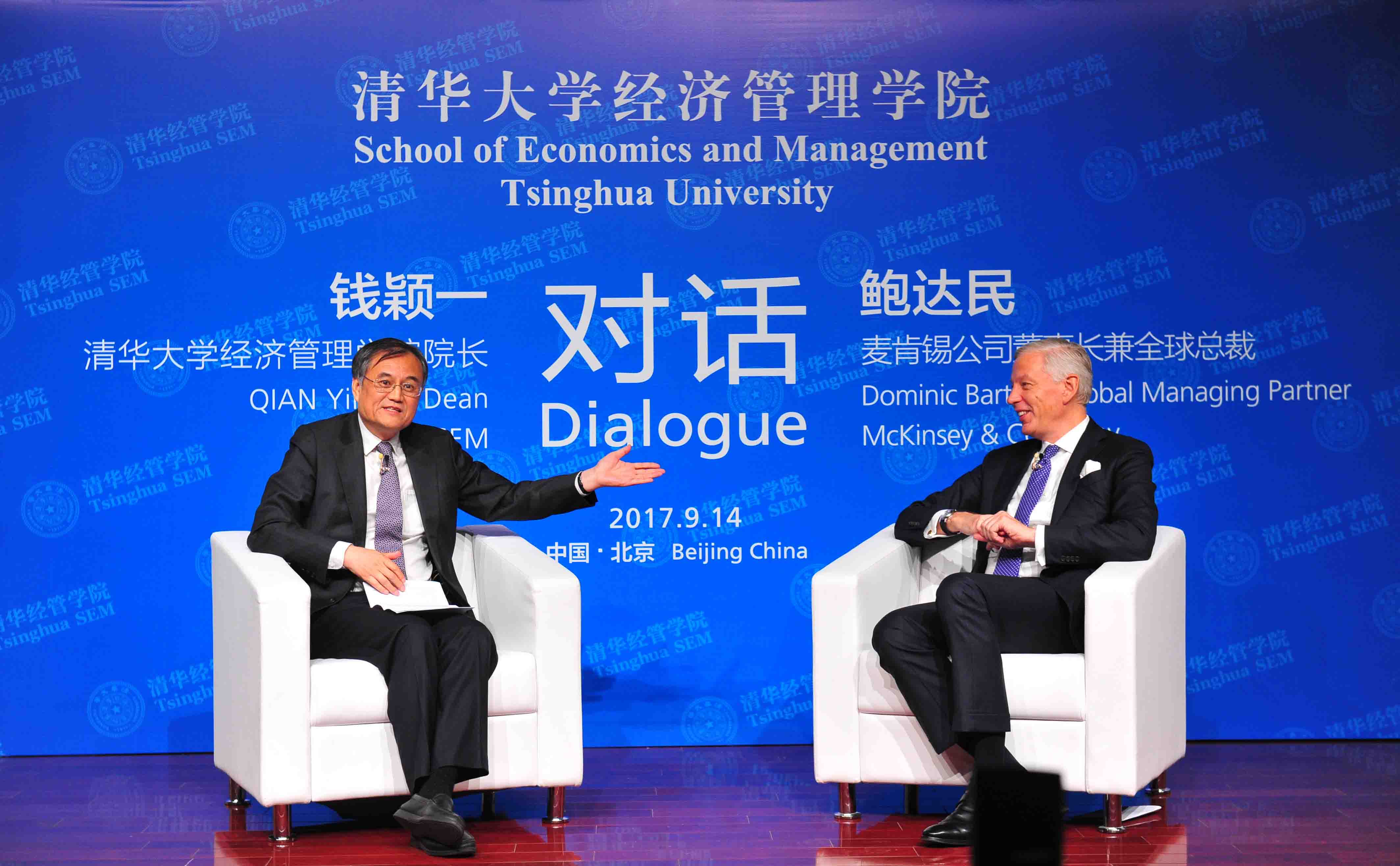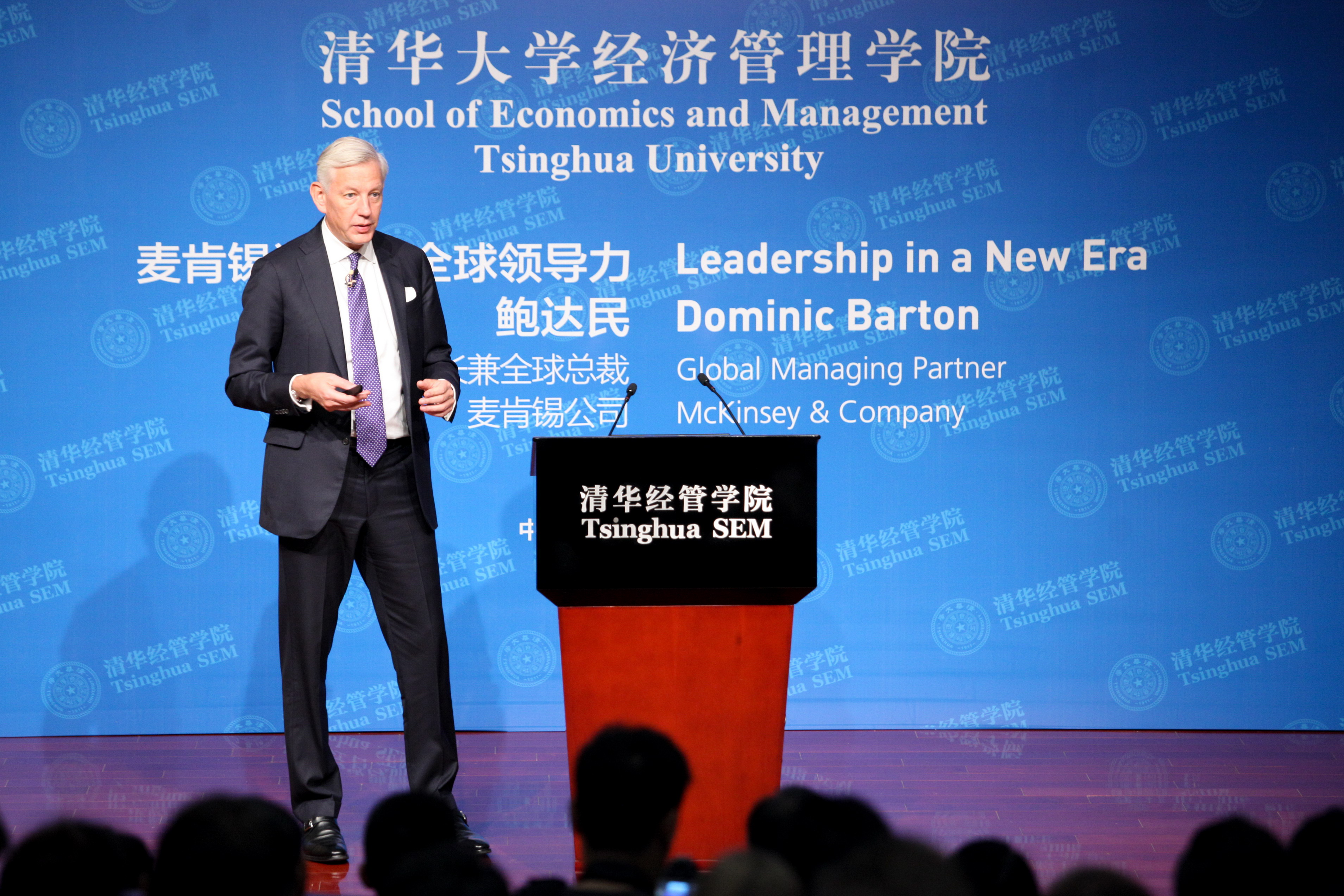Alex Rudnicki, the Tsinghua-MIT Global MBA Program, Class of 2019
What mega-trends are shaping the global economy, and how can present and future leaders manage the disruption and opportunity these forces are unleashing?
Dominic Barton, Global Managing Director at McKinsey sat down with Dean QIAN Yingyi of Tsinghua University’s School of Economics and Management (SEM) on September 14th for a fireside chat to share his thoughts.

The lecture, the first lesson of the 2017 McKinsey Global Leadership Course for Tsinghua Global MBA students, was also open to guests and attracted a packed auditorium.
Barton began the conversation focusing on the 4 mega-trends shaping the global economy now and into the future (global economic gravity shifting East, rapidly accelerating technology, rapidly aging populations, and changing societal frameworks), before beginning the Q&A section of the lecture.
How will successful leaders adapt to the volatility of this new era?
In their conversation Dean Qian dug in with questions around whether leaders are born or made, some of Dom’s favorite leaders today, and advice he’d give to his younger self.
On the characteristics of the best leaders, he said, “They’re unexpected leaders, courageous, selfless, they’re driven and curious.”
Dom named several, including:
Carlos Ghosn, CEO of Renault/Nissan - “One of the most global leaders I’ve ever met…he’s a Lebanese-Brazilian running a French-Japanese company. He spends one week in France, one week in Japan, then two weeks traveling around. He’s a long standing CEO. Most CEOs last 6 years, he’s been doing it for 15 years…he’s someone who is very disciplined about what he eats, when he goes to sleep.”
President Santos of Colombia - “I first met him when we were doing economic strategy for the country in Cartagena. We were in an ammunition bunker doing these presentations, and there were military people, religious people, and cultural people all around. I asked him what all these people are doing here. He said, ‘You know if these people don’t like what you’re saying, we’re not doing any of it, because we’re a society and it’s not just about the numbers.’ And what he did with the FARC guerrillas, negotiating with terrorists, which made his mentor disown him, takes such tremendous courage.”
Gherhard Schroder, Former Chancellor of Germany: - “One of my heroes…he put in labor reforms that enabled Germany to do [what it’s done], and he didn’t get reelected because of it…you have to have guts to do that, and we need more leaders who are thinking about how history will judge them instead of opinion polls”
What advice does Dom give to students who want to learn leadership?
1) Leaders are built through experience, they come from many different backgrounds and are not born. Experience a growth phase, experience a restructuring, experience a really challenging phase, and work on building other people’s talent.
2) Learn by reading biographies of famous leaders. Dom mentioned Alexander Hamilton -“Think about his background, he was an orphan…and he lead” and Franklin Roosevelt - “When WWII happened no one in the U.S. wanted to go to war. He didn’t do what most politicians in the West do now, where they do an opinion poll and then say let’s to do that, he figured out what should we do and then convinced people”.
3) Actively seek mentorship. “One of my best mentors in McKinsey was a senior partner and I was very junior, and he’d take me to very challenging meetings…very controversial. And sure enough one I go into the room the CEO would say ‘What’s that smurf doing in here. Does he know how to shave?’ And then the senior guy said, ‘No he’s here to pour the coffee, black coffee or white coffee, he’s very good. He’s here to watch.’
4) Move, geographically (every 5-7 years is a good idea) and move mentally out of your comfort zone.

Dean Qian, quoting Wikipedia, asked Dom about his “counterintuitive move” from Toronto in the late 1990s to South Korea, and how it ended up turning into the best move of his career.
Why move? While working with Paul Keating, Treasurer of Australia (later to become Prime Minister) on simplifying the Australian tax code, he received the advice:
“Dom, if you have half a brain, and I’m not sure you do, I would move to Asia, because that’s the future.”
He arrived in South Korea, 6 months before the Asian Financial Crisis devastated the county. Reflecting on the time, he remembered:
“My managing partner asked me ‘Dom do you play cards? Because after this we aren’t going to be doing any work. Do you like playing blackjack?’ But again, crisis is opportunity, because we were able to help restructure the Korean banking system, working with the World Bank and IMF. At the same time, I went to Singapore…and helped them build the banking system. That experience, I never would have had if I was in Canada.”
More recommended reading:
- Mark Wiseman on the risks of passive investing strategies
- On philosophical questions surrounding artificial intelligence: Homo Dues - A Brief History of Tomorrow by Yuval Noah Harari